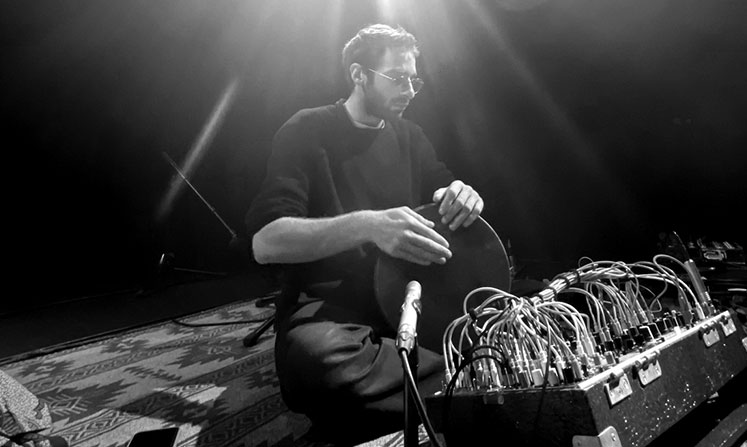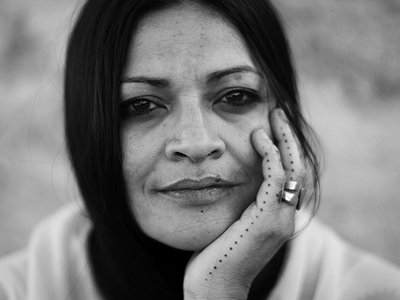Names: Azu Tiwaline, Cinna Peyghamy
Occupations: Composer (Azu), Percussionist (Cinna)
Nationalities: Iranian, France-based (Cinna), Tunisian/Cambodian, Côte d'Ivoire-born, France-based (Azu)
Current release: Azu Tiwaline and Cinna Peyghamy team up for Fifth Dream, out via I.O.T.
If you enjoyed this interview with Azu Tiwaline and Cinna Peyghamy and would like to stay up to date with them, visit their respective social media profiles: Azu Tiwaline (Instagram); Cinna Peyghamy (Instagram)
What were some of your earliest collaborations? How do you look back on them with hindsight?
Azu Tiwaline: I’m used to making a lot of collaborations, this is really something I am always looking for since years and years. I did so many different ones, from hip-hop, dub, reggae, pop singers, through dancers to producers from different universes …
I really love to search for a time and space where both artistic sensibilities can meet. Most of the time, it’s me who is asking. I’m like dreaming about one artist I admire, sometimes I dare to contact him/her/them, and generally, I don’t know how it’s possible for being so lucky, they agree.
The last one I did, other than the one with Cinna Peyghamy on my new album The Fifth Dream, was with Al Wootton.
There are many potential models for collaboration, from live performances and jamming/producing in the same room together up to file sharing. Which of these do you prefer – and why?
Cinna Peyghamy: For me it’s very difficult to collaborate from a distance. I have to be in the room with the other person, be it for jamming or producing, to feel the vibe and try ideas on the fly. Otherwise I think it takes away the essence and fun of it. I also consider being on stage the ultimate form of collaboration, as you and your partner are connected in order to deliver the best for the audience.
Azu Tiwaline: Well for sure we all prefer to be in the same room. But since the first lockdowns, it’s been more usual to think about making it by distance. Depending on the artist you collaborate with, it can work or not.
How did this particular collaboration come about?
Azu Tiwaline: I had been following Cinna’s work for a few years, when he used to produce under another alias (Cikkun). And I was already a big fan. One day, he posted a short video while playing with his new set-up: tombak and modular. And it sounded extremely interesting. I had been looking for a percussionist with a really specific sound for a long time. I mean, years and years.
So I went to see him playing a concert, felt definitely in love with what I could hear. At the end, I went to introduce myself and propose a recording studio session. A few months later, our first collab was released on Livity Sound. The beginning of an incredible music love life story.
What did you know about each other before working together? Describe your creative partner in a few words, please.
Cinna Peyghamy: She’s an extremely talented producer with a long career behind her. I genuinely love our relationship, I see her as my super-cool older sister who includes me in her adventures.
Azu Tiwaline: An amazing talent, curiosity and energy. And we are definitely on the same wavelength. No need to talk, explain, we are always on the same flow. It’s magic.
Tell me a bit about your current instruments and tools, please. In which way do they support creative exchange and collaborations with others?
Cinna Peyghamy: I use the tombak, a traditionnal persian percussion, in conjunction with a modular synthesizer. My work revolves around the hybridation between these two entities: how the electronics can affect the acoustic sound, how the acoustic instrument can control the electronics. It creates an amazing field of exploration which is really rewarding with happy accidents if you take the time to go deep in it.
I’ve collaborated with many other musicians by running their instruments trough the modular and processing their sound as they play, like I would do with mine. It’s a really fun way to jam with someone. 
Cinna Peyghamy Interview Image (c) the artist
With this specific collaboration, I think what’s interesting for me is to restrain all the possibilities of this setup to find the perfect sound or rhythm that would fit in Azu’s track.
Before you started making music together, did you in any form exchange concrete ideas, goals, or strategies? Generally speaking, what are your preferences when it comes to planning vs spontaneity in a collaboration?
Azu Tiwaline: Well there is always a part of things planned or made with spontaneity. We are generally searching for ideas, new sounds with the modular together, and after we focus on what we prefer and dive into it for days and days.
Describe the process of working together, please. What was different from your expectations and what did the other add to the music?
Azu Tiwaline: For the moment, it’s me who runs the production aspect. Which means that Cinna is bringing his sound, touch, vibe. Everything is recorded and afterwards I’m producing, editing everything on my own in my studio.
The fact that I’m collaborating with someone else means necessarily that I need to leave more space in the music, and focus on what is specific in our music, and then highlight that.
What tend to be the best collaborations in your opinion – those with artists you have a lot in common with or those where you have more differences? What happens when another musician take you outside of your comfort zone?
Cinna Peyghamy: Both can be extremely interesting and challenging at the same time. I quite like being dragged out of my confort zone, as it pushes me to create stuff that I would have never thought of in the first place. But when you connect with someone that has a similar background/thinking process than you, something really magical can happen.
Azu Tiwaline: Same as what Cinna said - but I would add that the human side is extremely important. It’s not only about collaborating with some artists, it’s also about sharing some values, and vibes, and opening our heart.
What are your thoughts on the need for compromise vs standing by one’s convictions? How did you resolve potential disagreements in this collaboration?
Cinna Peyghamy: I can’t really think of any disagreement that we had. Nonetheless, I think it’s really important to be able to keep your ego aside and consider every proposition that the other makes.
We’re usually on the same page when it comes to decisions regarding the liveset. For composition, we have very specific role, so there’s no room for clashes: she’s the producer who’s gonna create and build the track, I’m the musician invited to add “my sound”.
I do wish that we could produce together in the future though. Then maybe we will have more disagreements lol.
Was this collaboration fun – does it need to be?
Cinna Peyghamy: It is, because we both enjoy being around each other and having a good laugh. For me it’s essential in every long-term collaboration because this is why I started making music in the first place: for having fun.
Azu Tiwaline: It’s been more than 3 years that we have been experimenting and also playing live together. We became very close friends and we have a strong bond I cherish.
For sure we have some fun together, otherwise we could not collaborate since this long time in this regular way.
Do you find that at the end of this collaboration, you changed certain parts of your process or your outlook on certain creative aspects?
Azu Tiwaline: When I’m producing alone, I am always focusing more on the rhythmic part and how to create a special atmosphere, landscape in my music.
Working with Cinna, as a percussionist, prompted me to leave more space for him in the rhythm section. Which for me, is always interesting because I’m out of my comfort zone then.
Collaborating with one’s heroes can be a thrill or a cause for panic. Do you have any practical experience with this and what was it like?
Azu Tiwaline: Well, first, collaborating with one’s heroes is such a privilege. Even if you can be thrilled or in total panic, we need to never forget that this is an amazing opportunity. And sometimes, magic happens. And sometimes, your expectations may be too high, and you can end up a little
disappointed with the result.
But I think that the most difficult thing for me, is when you don’t feel any «consideration» or real interest coming from one of your heroes. And that’s the «human side» which for me, is the most important thing in a collaboration at the end. Not the music. But just about how two artists can connect on a human level beyond the purely artistic aspect.





